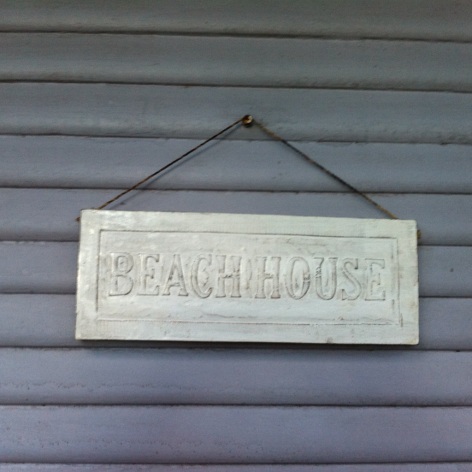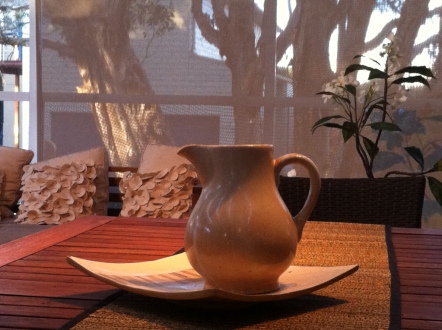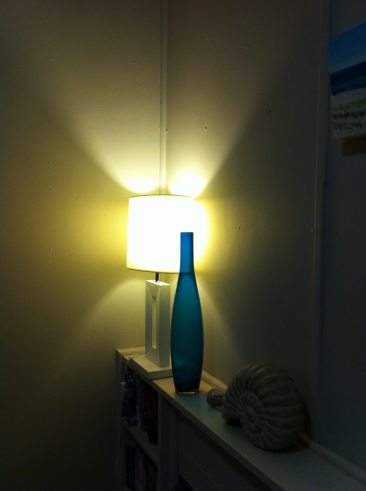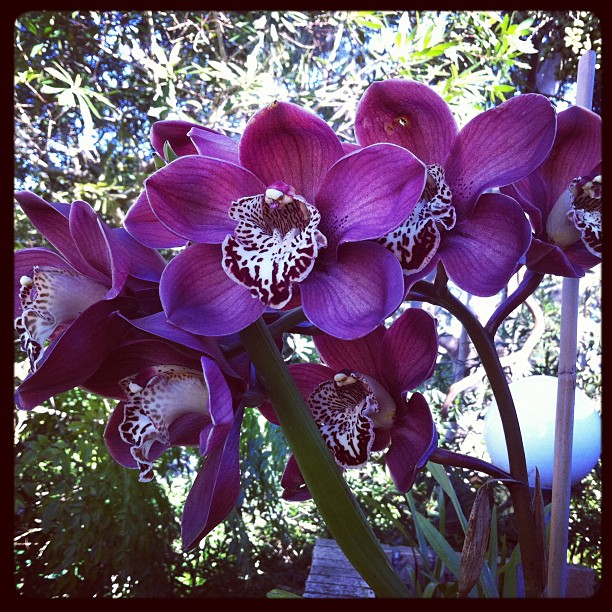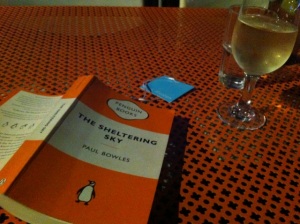Restart and reboot yourself
You’re free to go…
Shout for joy if you get the chance
Password, you, enter here, right now’
from ‘Unknown Caller’, U2
It was a small, old, blue, beach cottage, up the coast, hidden in trees, shells everywhere suggesting a time to be spent collecting yourself. The cottage even had a name, ‘Chill-out’, written in shells and hanging on the lounge room wall.
There were magazines, books, TV, DVDs, day beds. There was no network connection, no phone line, no internet. You could hear the roar of the sea’s thunder from the back room open out onto the air.
It was also across the road from where my parents used to live for some 15 years, before they moved back to the city about eight years ago. Since then, my brother and father have died, and I was bringing my mother back to where she lived before all this, back to happy places and old friends. My aunty also was with us; she lost her husband six weeks before my dad died. We had all come to visit and stay in this little town for most of our lives. And so we returned, and lots of thoughts came along with us, of people we loved who had also loved this place and who came here to recharge and unwind.
Having no internet was challenging. Life is all so very connected and I realised this past week how dependent on technology I am. Apart from the obvious work reliance on email, I have a strong need for personal connectedness it seems. I read the papers on the net; do sudoku and crosswords; connect with family, colleagues, friends and fellow bloggers and online friends who value creativity, reading and writing as much as I. I read a book and find out more about it online; I connect through Goodreads and find out more about the author. I find out what’s happening in the world through the news in my twitter feed. I research online content to inform my writing and read a huge range of blogs through feedly.
I write a blog, I create content, choosing as my focus ‘Transcending’ and dealing with love, loss and longing, strengthening yourself through reading, music, writing, strategy and productivity, whatever it is that gets you through, takes you up and onwards. I connect with other creative people through this and am keen to progress my blog writing during the week away. I find that without the internet, I can’t connect the parts, do the research, create the images, and even instagram fails to work.
So I take photos on my iphone. I enjoy the company of my family; we eat, we drink, we relax, we walk through a canopy of trees on a boardwalk beside the beach, we read, do sudoku, play scrabble, catch up with our old neighbour, now a sparkling blue-eyed 86 years young. We reminisce, we talk about those not with us any more as the place brings them back into our conversation and our lives.
I take two books to read that week that both turn out to be about the presence of those not there any more in the physical sense. ‘Poet’s Cottage’, by Josephine Pennicott, set in Tasmania, is all about family, ghosts, old houses and their history and the interplay between them. As reviewer, Elizabeth Storrs, comments, ‘If you ever have doubts as to whether ghosts exist, then you should visit Tasmania.’ This is true – I’ve felt this when travelling there, in old houses where you can feel a strong presence of others no longer there. ‘Poet’s Cottage’ was an atmospheric read about the past and its influence on the present.
Then I read Anne Tyler’s ‘The Beginner’s Good-bye‘ in which the main character, Aaron, loses his wife when she is struck down by a tree. He starts to see her again and have conversations with her, never sure if they are real or not. Through this, he begins to re-establish a new and different life.
It was only last night, coming home and reflecting on the week, that I realised my head was fully engaged in reading about the presence of those not there any more, of reflecting and moving on.
When we got home last night, our ipads were not connecting to the wi-fi. To get mine to work, I turned off and rebooted, suggesting to my partner, “Sometimes you just need to restart to make all the connections again.” Even when the words come out of my own mouth, I don’t get it straight away. The universe must think me so slow.
So today with time to reflect on a deeper level and stumbling across the words above from U2’s ‘Unknown Caller’ in one of my notebooks, I finally gather together what the week was about: the opportunity to turn off some of the input, unscramble the data, to recalibrate and reboot, knowing I have the password and the resources to shift up and on to what matters, with the love of those who have left us, still ringing in our memories, somehow cheering us on.
<div
Full review of ‘Poet’s Cottage’ coming soon as part of the Australian Women Writer’s 2012 Reading and Reviewing Challenge.

